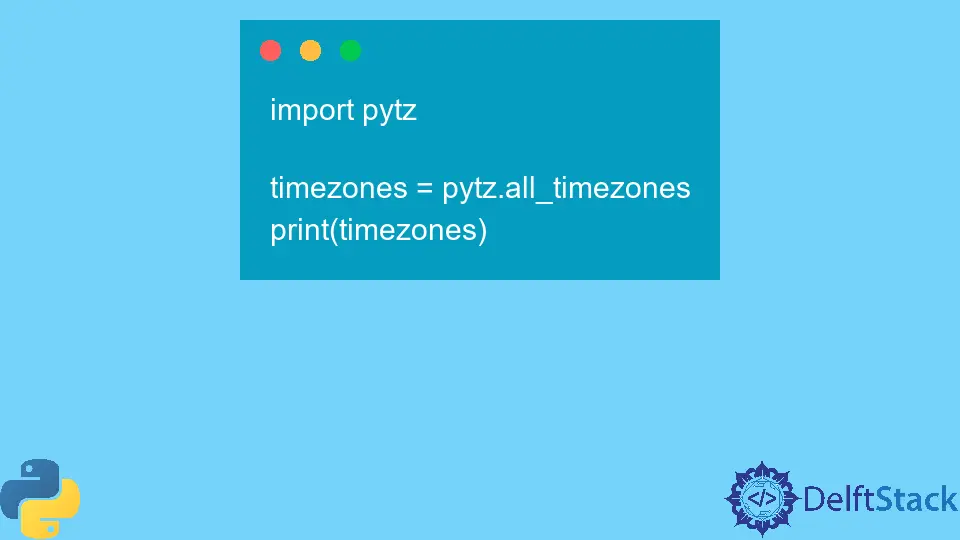How to Get the Timezones List Using Python

When working with date and time in Python, it’s crucial to handle timezones correctly. Timezones can significantly affect how we interpret and display dates and times. Fortunately, Python provides robust libraries that make it easy to retrieve a list of all available timezones.
In this article, we will explore how to get the timezones list using Python. Whether you’re developing a web application, scheduling tasks, or simply need to display local times, knowing how to access and manipulate timezones can enhance your programming capabilities. Let’s dive into the methods to retrieve timezone information seamlessly.
Using the pytz Library
One of the most popular libraries for handling timezones in Python is pytz. This library allows you to access the full list of timezones defined in the IANA Time Zone Database. To get started, you’ll first need to install the library if you haven’t already. Use the following command in your terminal:
pip install pytz
Once you have pytz installed, you can easily retrieve the list of available timezones. Here’s a simple code snippet to do just that:
import pytz
timezones = pytz.all_timezones
for timezone in timezones:
print(timezone)
Output:
Africa/Abidjan
Africa/Accra
Africa/Addis_Ababa
Africa/Algiers
...
Pacific/Wallis
The code above imports the pytz library and accesses the all_timezones attribute. This attribute contains a list of all available timezones. We then loop through this list and print each timezone. This method is straightforward and efficient, making it ideal for applications that require timezone awareness.
Using pytz is highly recommended because it is well-maintained and provides accurate timezone data. Remember, working with timezones can be tricky, especially during daylight saving time changes, so relying on a trusted library like pytz ensures that your application handles these nuances correctly.
Using the ZoneInfo Module in Python 3.9+
If you are using Python 3.9 or later, you can take advantage of the built-in zoneinfo module. This module provides a standard way to work with timezones without needing an external library. Here’s how you can retrieve the list of timezones using zoneinfo:
from zoneinfo import available_timezones
timezones = available_timezones()
for timezone in timezones:
print(timezone)
Output:
Africa/Abidjan
Africa/Accra
Africa/Addis_Ababa
Africa/Algiers
...
Pacific/Wallis
In this example, we import the available_timezones function from the zoneinfo module. This function returns a set of all available timezones. We then iterate through the set and print each timezone. The zoneinfo module is a great alternative to pytz, especially for those who prefer not to install additional packages.
Using zoneinfo simplifies timezone management in Python applications. It integrates seamlessly with the standard library, making it an excellent choice for projects that require timezone handling without additional dependencies.
Conclusion
Retrieving the list of timezones in Python is a straightforward process, thanks to libraries like pytz and the built-in zoneinfo module. By understanding how to access and manipulate timezone data, you can ensure that your applications handle date and time correctly across different regions. Whether you choose to use pytz for its extensive features or the zoneinfo module for its simplicity, both methods will serve you well. Embrace the power of timezones in your Python projects, and you’ll find that managing dates and times becomes much more manageable.
FAQ
-
What is the difference between pytz and zoneinfo?
pytz is an external library that provides a comprehensive list of timezones, while zoneinfo is a built-in module in Python 3.9 and later that offers similar functionality without requiring additional installations. -
Can I use pytz with Python versions earlier than 3.9?
Yes, pytz is compatible with earlier versions of Python and is widely used for timezone management. -
How do I convert a datetime object to a specific timezone?
You can use the localize method from pytz or the astimezone method from the datetime module to convert datetime objects to specific timezones. -
Are there any performance differences between using pytz and zoneinfo?
Generally, zoneinfo may have performance advantages since it is built into the standard library, but the difference is usually negligible for most applications. -
How do I handle daylight saving time changes in Python?
Both pytz and zoneinfo handle daylight saving time automatically based on the timezone data they use, so you can rely on them to manage these changes for you.
